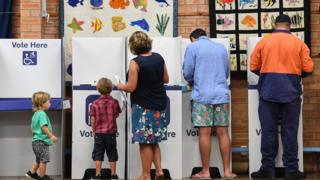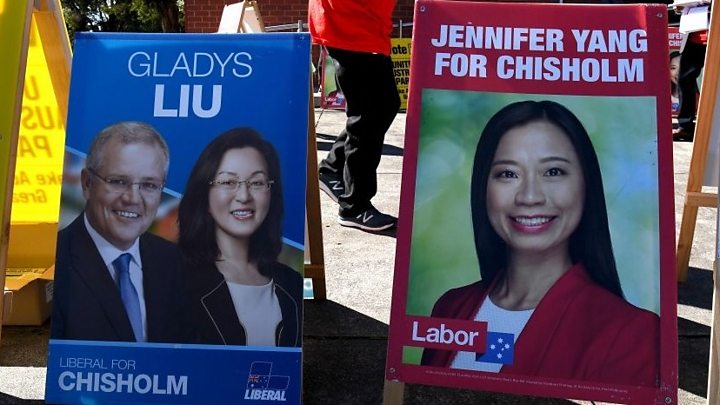Home » Australasia »
Australians vote in ‘generational’ election
Australians will vote on Saturday in the first general election since brutal party infighting ousted the nation’s fourth leader in a decade.
PM Scott Morrison says he has united his conservative government in the nine months since he replaced Malcolm Turnbull.
Labor opposition leader Bill Shorten has pressed his case with stark policy alternatives.
Australia has mandatory voting and a record 16.4 million enrolled voters.
The nation holds elections every three years, but no prime minister has succeeded in serving a full term since 2007.
The poll will take place just two days after the death of Bob Hawke, a long-serving former prime minister whose achievements have been hailed across the political spectrum.
What are the key issues?
Surveys have shown that the economy, cost of living, environment and health are central concerns for voters.
It is in many ways a generational issue election, experts say, with younger people in particular voicing frustration about climate change and a lack of affordable housing.
Others have argued that older Australians would be most affected by tax reform proposals that have dominated much of the campaign.
It follows fierce debates in the past year about the rolling leadership turmoil, formal recognition of indigenous Australians, and the treatment of female MPs in parliament.
Who are the contenders?
As the Liberal-National government seeks its third term, Mr Morrison claims to have healed bitter internal divisions that brought down Mr Turnbull.
He has campaigned primarily on economic issues, often doing so alone while painting the election as a choice between himself and Mr Shorten.
Mr Shorten, who has led Labor for six years, has instead emphasised his team’s stability and policies on climate change, cost of living and health.
Also vying for support are minor parties including the Greens, One Nation and the United Australia Party, as well as a raft of independents.
Crunch time after fierce campaign
By Hywel Griffith, BBC News Australia correspondent
Australians follow the maxim often attributed to Al Capone: “Vote early – and vote often.”
The rapid cycle of state and federal elections means it is never too long before people have to head back to the polling booths.
And given that it is compulsory to take part, many like to get voting out of the way nice and early so that they can get on with their weekend.
This time around the campaign has been fierce, but it has produced few surprises – even an attempt to egg the prime minister didn’t reveal any cracks.
If Scott Morrison does survive the vote, he’ll be revered as a one-man election-winning machine, who fought and won largely on his own.
If he loses, Australia will have its fourth prime minister in just four years.
How does the vote work?
Australian elections always take place on Saturdays. This time about 7,000 polling stations will be set up across the nation, the Australian Electoral Commission (AEC) says.
But people can vote early at pre-polling stations, and a record number – more than four million people – have elected to do so in 2019.
Because voting is compulsory, anyone aged over 18 faces a A$20 (£11; $14) fine for not taking part.
At the last election, 95% of Australians voted – a much higher proportion than the most recent US (55%) and UK (69%) polls.
Who will win?
Opinion polls have consistently put Labor in front on a two-party preferred basis, but the gap has narrowed closer to the election.
This is despite the same measures showing that Mr Shorten trails Mr Morrison as preferred prime minister.
Voting closes at 1800 local time (0600 GMT) in Australia’s east on Saturday, with the first results expected soon afterwards.
If you have a question about the Australian election you can send it to us via the form below.
If you are reading this page and can’t see the form you will need to visit the mobile version of the BBC website to submit your question.
Source: Read Full Article





